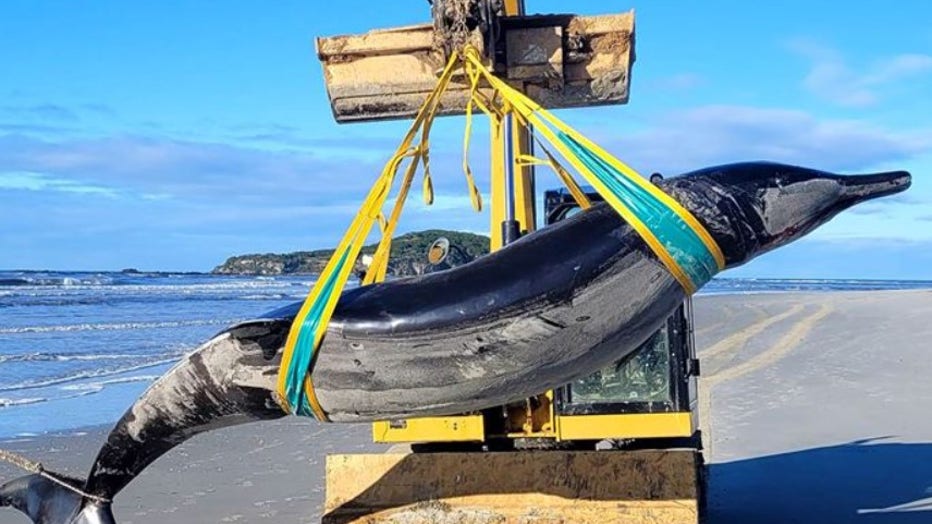Rare spade-toothed whale may have washed ashore in New Zealand

Remains of world's rarest whale wash ashore in New Zealand
The remains of a spade-toothed whale, considered the ?world?s rarest whale,? washed ashore in Otago, New Zealand. (Credit: Department of Conservation, New Zealand via Storyful)
WELLINGTON, New Zealand - A spade-toothed whale, one of the world's more rare species, is believed to have washed ashore on a South Island beach in New Zealand, the country's conservation agency announced Monday.
The creature is described as five meters in length, with distinct color patterns and shapes of its skull, beak and teeth.
If the cetacean is confirmed to be the elusive spade-toothed whale, it would be the first specimen found in a state that would permit scientists to dissect it, allowing them to map the relationship of the whale to the few others of the species found, learn what it eats and perhaps lead to clues about where they live.
RELATED: Shark Watch: American on Bahamas vacation yanks shark's mouth open and 'arm just flies out'
"We know very little, practically nothing" about the creatures, Hannah Hendriks, marine technical adviser for the Department of Conservation, told the Associated Press. "This is going to lead to some amazing science and world-first information."

In this photo provided by the Department of Conservation rangers Jim Fyfe and Tūmai Cassidy walk alongside what is believed to be a rare spade-toothed whale, on July 5, 2024, after its was found washed ashore on a beach near Otago, New Zealand. (Depa
Only six other spade-toothed whales have ever been pinpointed, and those found intact on New Zealand’s North Island beaches were buried before DNA testing could verify their identification, Hendriks said, thwarting any chance to study them.
New Zealand’s Indigenous people consider whales a taonga — a sacred treasure — of cultural significance. In April, Pacific Indigenous leaders signed a treaty recognizing whales as "legal persons," although such a declaration is not reflected in the laws of participating nations.
RELATED: 12-year-old reels in record-breaking fish from northwestern Montana reservoir
Nothing is currently known about the whales’ habitat. The creatures deep-dive for food and likely surface so rarely that it has been impossible to narrow their location further than the southern Pacific Ocean, home to some of the world’s deepest ocean trenches, Hendriks said.
The conservation agency said the genetic testing to confirm the whale's identification could take months.
The first spade-toothed whale bones were found in 1872 on New Zealand’s Pitt Island. Another discovery was made at an offshore island in the 1950s, and the bones of a third were found on Chile’s Robinson Crusoe Island in 1986. DNA sequencing in 2002 proved that all three specimens were of the same species — and that it was one distinct from other beaked whales.
The Associated Press contributed to this report. This story was reported from Los Angeles.

